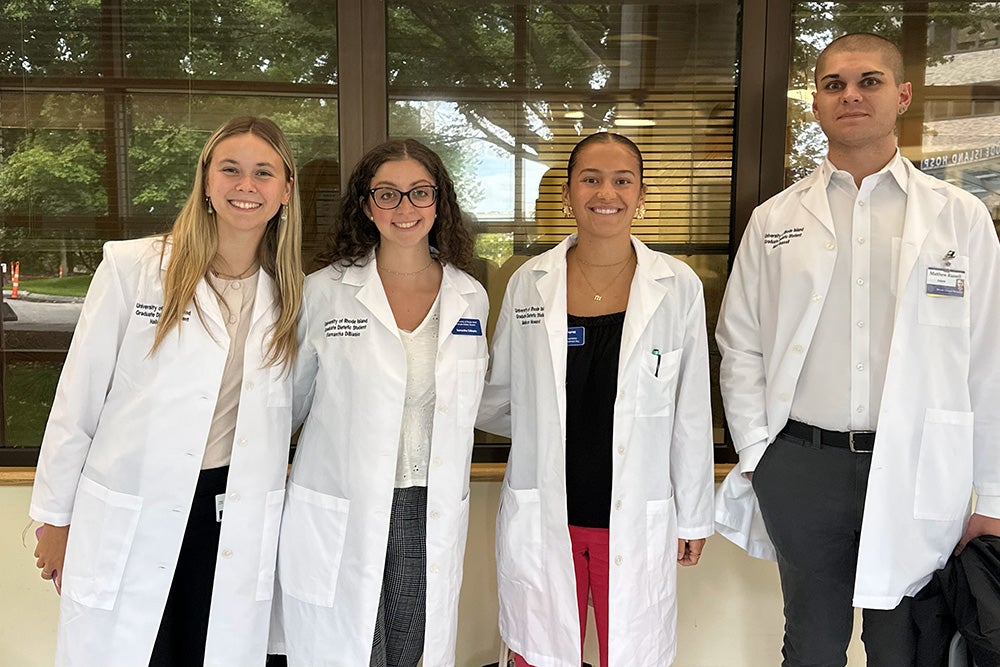Graduate Dietetics Future Education Model
Overview
The Dietetics Future Education Model Graduate Program (FG) is a master’s degree program in the Department of Nutrition (NUT), College of Health Sciences. Our program provides an outstanding didactic curriculum including coursework in sustainability, research, epidemiology, international nutrition, nutrition metabolism, and community as well as over 1,100 hours of supervised practice in professional work settings.
About the Program
This two-year intensive program is designed for students who want to become Registered Dietitians/Nutritionists through an accredited Dietetics Future Education Model Graduate Program including experiential and didactic learning leading to a M.S. degree. It is a competency-based education (CBE) program that integrates classroom learning with supervised experiential learning.
The facilities where you’ll gain supervised learning experiences are found throughout Rhode Island and represent some of the best healthcare institutions in Southern New England. The variety of facilities provides an opportunity for you to experience different management styles and organizational climates. Classes associated
with the program are held at URI’s Kingston campus.
Experiential Learning
Experiential learning covers 35 weeks with a minimum of 1,100 hours of supervised practice in health care and community facilities. The program generally follows the URI 36-week academic calendar. The program is organized as follows:
- Semester 1: focusing primarily on didactic coursework
- Semester 2 & 3: focusing on experiential learning with supportive didactic coursework
- Semester 4: focusing primarily on didactic coursework.
Highlights of the experiential learning include:
- 15 weeks of inpatient Medical Nutrition Therapy, including 7 weeks in a large tertiary care facility
- 7 weeks of foodservice management with options for university or hospital foodservice operations
- 7 weeks of community rotations including SNAP-Ed, long-term care, and private practice outpatient counseling
- 5 weeks of a specialty rotation with options for critical care, pediatrics, outpatient counseling, or community
- 1-week student-initiated learning self-management rotation
Accreditation
The Dietetic Internship is accredited by the Accreditation Council for Education in Nutrition and Dietetics (ACEND), 120 South Riverside Plaza, Suite 2000, Chicago, IL 60606, 312.899.0040, ext. 5400.
Program goals and objectives as well as program outcome data are available upon request.

Becoming a Registered Dietitian Nutritionist
In order to become a Registered Dietitian/Nutritionist (RDN), you must successfully complete:
- Educational requirements such as a Didactic Program in Dietetics,
- A graduate degree,
- An accredited experiential program providing at least 1,000 hours of supervised practice, such as the FG, and
- The RDN credentialing examination.
2025 Open House
Professional Licensure Disclosure
In accordance with the 2019 Reauthorization of the Higher Education Act, URI hereby discloses that the curriculum for this program meets the educational requirements for licensure as a Registered Dietitian in all U.S. States and Territories. The applicable licensing board in these states may impose additional requirements* on candidates prior to granting a license (e.g., passing of an exam; completing a post-baccalaureate internship; etc.), and we encourage you to investigate those requirements with your licensing board. For information about state licensure in your state see https://www.cdrnet.org/LicensureMap.
*Accreditation Council for Education in Nutrition and Dietetics (ACEND) requires the completion of a 1,000-hour, post-baccalaureate supervised experiential learning hours to meet eligibility requirements to sit for the Registered Dietitian credentialing exam.

